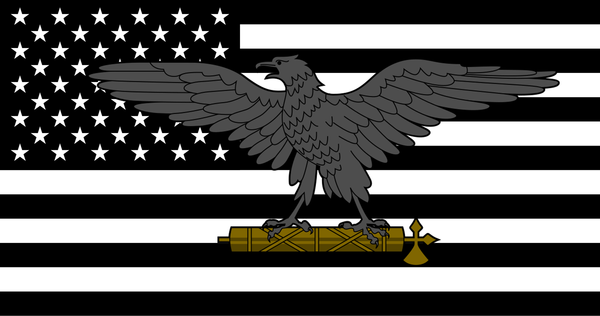Foreign Policy As If Liberalism Mattered
Neither states nor nations are endowed with inalienable rights. Individuals are.

What would a radically liberal foreign policy look like?
I don’t think we’ve ever had one. As we’ve all seen it, foreign policy is the domain and the creature of nation-states, while liberalism aims at taking individuals’ liberties seriously. Making that liberty interest show through isn’t easy in foreign policy.
Idealism is a common try among policy scholars, and something like it seems to come intuitively to a lot of the public. In an idealist foreign policy, the United States sees itself as a world power, and maybe as a world hegemon—but it’s for liberal reasons, and that makes it okay. We make the world safe for democracy, and delivering that safety often entitles the United States government to a whole lot of slack. Surely, an idealist says, our liberalism lets us deal tyrannically with other nation-states, who are almost certainly a lot less liberal. We are the “indispensable nation”; our foreign policy aims to secure a just peace among nation-states, to secure human rights through treaties and international institutions, to reform illiberal nation-states where possible, and in the last resort, to bind intractable nation-states to a lawful international order, limiting the harm they do. All that is reason enough for a few hegemonic exceptions.
The trouble with idealism is that it’s a deal with the devil. Whenever idealism compromises, it’s the nation-state that it compromises with, and the nation-state’s self-interests tend to involve exerting more power over territories and peoples.
Thus, at the end of World War I, Woodrow Wilson, one of the chief architects of American foreign policy idealism, made the nation-state his most trusted instrument of reconstruction. Nation-states, he argued, can and should cooperate to achieve peace, and peace was about keeping nation-states happy.
It’s worth spending some time on what a nation-state really is, because the terms “nation,” “state,” “country,” and even “government” can be thrown around with a lot of ambiguity and overlap in popular media. The muddle that results means that we often talk past each other about one of the most consequential features of all of our lives.
A nation-state is a political entity in which the people of a nationality are also the subjects of a state that they make for themselves. As an ideal, the nation-state arguably originated in the French Revolution, and it got a powerful boost from the revolutions of 1848. Throughout the nineteenth century, nationalists asked themselves, reasonably enough: Aren’t empires the real problem? Look at Austria-Hungary, the Ottoman Empire, and Russia; if we broke them up and put nation-states in their place, wouldn’t that bring peace? It was a tempting idea, and with Europe in ruins anyway, Wilson took them up on it. He didn’t get a lot of what he asked for, but even so, American foreign policy has never been the same since. We have commonly been idealists for the cause of the nation-state, which we trust will be democratic and liberal.
Of Wilson's Fourteen Points, ten addressed nation-states and their concerns directly. Several of them, like the evacuation of Belgium, were also genuine human rights matters. Others were a lot more arguable. Of the points that saw some practical implementation, many didn’t further the cause of peace at all, or they were swept away by the backlash: The Allies intervened, fecklessly, to stabilize the Russian provisional government, which collapsed into communism anyway. Alsace-Lorraine went back to France, aggrieving Germany instead. Poland got its freedom—for all the good that it did; few countries’ citizens would suffer more in the next war than Poland’s. The “other nationalities of the Ottoman Empire” weren’t named by name in the Fourteen Points, which gives you some idea of where they ranked, and how they fared.
Only the first four of Wilson’s points aimed at achieving liberal ends in a general sense, as opposed to particular cases where liberal ends were thought to coincide with state interests. One of these general points, the fourth, is more or less a truism: Of course all states should pledge to limit their arms to what’s necessary for domestic safety. The whole trouble is that states also decide what’s necessary. Liberalism gets lip service, and states do more or less as they’ve always done.
This should all seem strange for a liberal foreign policy: Are we, as liberals, really saying that states’ territories should be ethnically pure? Would we ever say that at home? What are we doing fanning the flames of nationalism? And are we happy with how it’s going to shake out in the long term?
The Fourteen Points were all but entirely concerned with elevating the nation-state, defining its borders, and reassuring it that its claims as an organizing principle of human life were more important than ever. Was Wilson's proposal meant to achieve a just peace, and to put liberalism in the driver’s seat? Certainly, but only with the nation-state as the vehicle.
Idealism has had a long history, though not always a glorious one. Neoconservatism is an idealist approach to foreign policy; so is liberal internationalism. LBJ and GWB were both idealists. Among its other achievements, idealism brought us to the debacles of Iraq and Vietnam, and the difficult muddles of Korea and Kosovo. One might say that it’s failed, been reinvented, and failed again, over and over, always in time to bless the next foreign adventure.
Idealism is hard to kill because it appeals to people across the political spectrum, and it does so by reminding us of what we like about our own society: Wouldn’t it be great if we could export that? Unfortunately it tends to fail in the same way whenever we try: Idealism degrades liberalism from within, and it leads to quagmires without. Foreign nation-states are self-interested institutions, and they value their own preservation a lot more than they value making the world safe for democracy. Setting up a new foreign nation-state can be an expensive way to roll the dice. It could make things better, but often, it doesn’t.
Given the failure of idealism, realism practically suggests itself. Realists will tell you that acting as the world’s policeman has a lot more downside than up. War is the health of the state, some of them may say—which means that war pushes countries powerfully toward autocracy. We should avoid foreign entanglements, like George Washington said. If nothing else we’ll have more liberalism at home, and home concerns are valid in their own right. (“America first” is, or it can be, a realist foreign policy slogan.)
Realists see themselves as an older and less ambitious foreign policy approach, and they’re not wrong about that, either. The “reality” that realists acknowledge is that regional powers elsewhere have their own spheres of influence, much like the one that we’ve claimed for ourselves in the Western Hemisphere. The path to peace lies in stabilizing these spheres and policing their boundaries: Avoid conflicts between hegemons, but let smaller wars rage if they’re well contained. Don’t intervene, above all when a hegemon polices its own backyard. Give a little, and we all avoid World War III.
The trouble with realism is that it swaps one system that’s too focused on nation-states for another with the exact same flaw: Drawing on thinkers like John Mearsheimer, foreign policy realists may say that liberalism’s best chance at survival isn’t to impose a world order, but to serve as the philosophy of a regionally hegemonic, but still highly empowered, nation-state. America’s task in a world like that is to manage a comparatively modest set of commitments in light of the commitments of other, and essentially similar, regional hegemons. We don’t have a special worldwide mission, but we may still matter a lot.
An idealist might say that under realism, countries can only be liberal when their hegemon says so. Liberalism should exist, but only when it’s the path of least resistance. Not all hegemons will be liberal, and giving hegemons their due will mean giving illiberalism way too much. The idealist’s point stands strong when we recall that other hegemons have never been especially liberal, and that "realism" often degrades into cheering for tyrants.
Whatever the case may be, a realist United States oversees one quasi-empire among several. With the other regional hegemons, we trade the smaller countries—and the individuals they contain—like cattle. Peace comes mainly when one hegemon allows another’s claim. This is what it looks like: “The United States has serious plans regarding Greenland,” Vladimir Putin recently said. “These plans have long historical roots … and it is obvious that the United States will continue to consistently advance its geo-strategic, military-political, and economic interests in the Arctic.”
Game recognizes game: The peace that we all want will come once we’re done putting Denmark in its place, as hegemons do. Because Russia is also a great power, we should give Putin what he wants, and maybe remind Ukraine that it “doesn’t have the cards.” Cards are for hegemons.
Countries on the borders between spheres of influence, like Turkey, might have to make tough choices and/or fend for themselves. Some realists might quote to them Thucydides’ Melian Dialogue: “The strong do what they can and the weak suffer what they must.”
That’s a common realist turn, but the “Athenian” in that dialogue was not the good guy. Some lucky smaller states might get to choose their own hegemonic masters, as the Melians well knew. Possibly though, we hegemons will end up fighting over the rest for a long time to come: Who doesn’t like a wider sphere of influence? And when you think you’re the master of a nation-state, that sphere of influence is yours. It shouldn’t have to be said, but this isn’t liberalism. It’s sordid haggling over other people’s lives.
One thing gets forgotten in all of this: When war comes, individuals lose. Again, a state-first attitude has pretty clearly run away with the whole project, which never seems to focus on the wellbeing of anything else at all. Between idealism and realism, “we’re doing it for human rights” is one excuse, and “this is how great powers act” is another. But both excuses serve the nation-state’s hold on our lives as individuals.
We might ask: Liberalism at home starts with the individual, with their rights, their dignities, and their personal development. What would our foreign policy look like if we stopped seeing the world as consisting of 200-odd states? What if we saw foreign policy as mostly about a world of 8 billion individuals—with the states usually standing in the way of how we would prefer, as liberals, to treat them?
What if we turned our foreign policy thinking toward treating each individual foreigner as worthy of rights, dignity, and respect, unmediated by the states that claim them as subjects? Our state doesn’t exist to make other states happy. We are an independent liberal democracy, not one of their clients. The United States of America exists to instantiate liberty for individual people, and never mind their ethnicity. Neither states nor nations are endowed with inalienable rights. Individuals are. We must learn to see the interests of nation-states as different from, and only partially overlapping with, the interests of the people they enclose.
Not everything that justice asks of us in regard to foreign individuals is usually classed under foreign policy. There are some good reasons for that; states can muster a lot more raw power than individuals, and it’s natural to want to use that power for good, like the idealist would do. But if we’re serious about liberalism, we ought to be denying the demands of states a lot more often in favor of the individuals they oppress.
Consider: Why don’t irregular migrants to Europe fly? Why do they die in decrepit fishing boats and leaky dinghies? It’s not that they can’t afford flying; paying a smuggler is usually more expensive, not less.
No, the narrative of desperately poor people streaming uncontrollably into Europe is built on a mirage, which states asked to be produced, and which an EU regulation sustains. That regulation could be changed at any time, and people might start surviving. Because that bothers European states, European liberals are reduced to hoping quietly that migration goes away on its own. Anything tougher is just an echo of the nationalist parties.
We’ve seen this in the United States, where candidate Kamala Harris’s immigration proposals focused above all on border security. Her campaign seemed at pains to avoid even mentioning the massive economic betterment that more immigration would bring. The whole 2024 election cycle treated immigration as a crisis—which it is not. No one should be surprised, then, that voters picked the guy who ran on mass deportations; the only thing we agreed on was the existence of a crisis. If you’re truly worried, “border security” is too little, too late. It’s an echo, not a choice.
Migrants cross our southern border on foot for the same reasons that migrants come to Europe in dinghies: they’re not allowed to fly, so they pay more, and they take a bigger risk. All the while, our government is trying to catch them, put them in a cage, and send them somewhere—these days possibly far from home, and for an unknown term.
An individualist foreign policy would end these horrors overnight by letting migrants fly in and remain here for as long as they liked. No, immigration isn’t usually seen as a foreign policy issue. We should understand it as absolutely central, though. It’s the single biggest way that we can bring liberalism to the world.
That point’s made with great clarity in Ilya Somin’s book Free to Move: Foot Voting, Migration, and Political Freedom. Somin argues that migration in search of a better life is a kind of voting with your feet—it's an exit, like in A. O. Hirschman’s classic book Exit, Voice, and Loyalty.
Exits are among the most powerful political statements an individual can make. Everyone knows that leaving home is costly, and when a signal is costly, it’s hard to fake. Exits not only help the individual directly, but they build political pressure for reform back home. Denying individuals exit, which states do through widespread international migration controls, is a sop to tyranny. Free people don’t usually want to leave a country that guarantees their freedom, unless it’s for a better opportunity in another free country. It’s the states, and especially the tyrannical ones, that need people to stay put.
A liberal foreign policy should act as if it believed in itself, as opposed to the state, its untrustworthy agent. Liberals should say: “Liberalism works, and everyone’s invited.” (If you don’t believe in this, then you should stop calling yourself a liberal, and find something else that you do believe in.) In every respect, liberalism has to treat being liberal as the practically effective approach that it is—and being liberal has to be about the recognition of individual rights.
We should not favor theories of international relations that offer state-sized solutions, or those managed by states or coalitions of states. Outside of overt wars of aggression, state boundaries and where they stand with respect to ethnic boundaries don’t make a good proxy for individual rights. Many countries are happy, peaceful, and multiethnic. Ethnically pure populations are unimportant to liberalism. What’s valuable are the incentives that all states should face to better the lives of their people. When we rebuild after Trumpism, we should unilaterally pursue policies that pressure other states to respect individual rights and dignity. When states repress their citizens, we should offer them a new home.
Let them all in, aggressively. Shame the tyrants. Show the Maduros and Putins of the world how well liberalism can do for their very own people. Make the autocrats feel small, ineffective, and vulnerable. Which they are.
Will the character of the United States change? When has it ever not changed? If we opened the borders, would we be overrun by tens of millions of Indians? No, that’s a racist fantasy. Long before it happened, their government would be forced into a choice: Make life better at home, or court a revolution. In the meantime, we could easily absorb a few million of the most ambitious and America-friendly people, who are almost always the most inclined to leave.
We know this because we’ve done it before. Indeed, we’re doing it right now: In the last decade, the United States accepted over half a million migrants fleeing Venezuela’s oppressive dictatorship and imploding economy. The Venezuelan diaspora comprises at least 7 million people, some 20% of the country’s population. Our economy hasn’t tanked—it’s prospered—and life for the migrants is vastly better than it would have been otherwise. Nicolás Maduro still clings to power, but he’s arguably been very, very lucky. Don’t be surprised if he’s assassinated.
If I were president, this is how I’d meet every dictatorship on earth: I will threaten you with the escape of all your most enterprising subjects. We’ll happily make better use of their talents. They’re Americans now; they chose it because our system is better than yours. Our citizens choose to stay. Because they like it here.
A properly liberal America wouldn’t care at all about the trade deficit. Instead it would care about the migration deficit: Are we the kind of society that people actually want to live in? Are they proving it by foot voting? Or are we losing people on net? The governments with real problems are the ones with a chronic population outflow, especially given the worldwide, cross-cultural decline in birthrates.
The foreign policy of the United States should be to compete directly for individuals’ loyalties. Overtly, in the case of dictatorships. In a friendly way, with countries like France or the UK, who are welcome to pursue similar policies whenever they like. Let’s compete worldwide for every individual’s unforced affinity. We’d make the American flag scare all the right people again, and we wouldn’t have to fire a shot to do it.
If we and several other states were all to take individuals’ loyalties more seriously, a paradoxical thing would happen: Many fewer would need to migrate. Governments of all kinds will have been put on notice: Change your policies now. Your subjects have lots of other options, and many of them are really nice.
A radically liberal trade policy might be the most pressing addition: Unilateral disarmament wins tariff wars by letting individuals and firms deal with one another in freedom. We should do that the moment Donald Trump’s out of office. The old system of multilateral trade agreements did lower tariffs worldwide, and by a lot, but it took decades to build, and it would take decades to rebuild. We should skip those decades of needless waste and suffering. In the process, we’d set a good example for other governments to follow.
We want the people of other countries thanking us, not begging for mercy. The whole world should ring with the double thank-you of honest commerce. The world where foreigners pay tribute—where we say thank-you, and they mutter curses—is a bad world. We don’t have to live there.
Free trade is the escape. A liberal idealist would seek free trade through agreements among nation-states. Some realists might want free trade only within our sphere of influence, and they might want the government always taking a cut, which isn’t free trade at all. An individualist unilaterally repeals domestic tariffs and calls it a day. Maybe other nation-states will follow, but even if not, it’s their loss, and it’s our gain.
Call it the Galt’s Gulch/Emma Lazarus/chaotic-good-Borg approach: We’ll act unilaterally if we must. It will be to help individuals survive, work, trade, and thrive. We'll be their refuge if they ever need one. Their uniqueness might be added to our collective, but only with consent. We’re not in this for anyone but the individual, whom foreign policy has dispossessed. We serve neither statism nor nationalism. We know that most of the existing states should die or be reformed, and our duties in respect to them are simple: We must set up the incentives that push them to change.
Featured image is "Emma Lazarus Engraving," T. Johnson and W. Kurtz 1889. Laser eyes added with memed.io.




